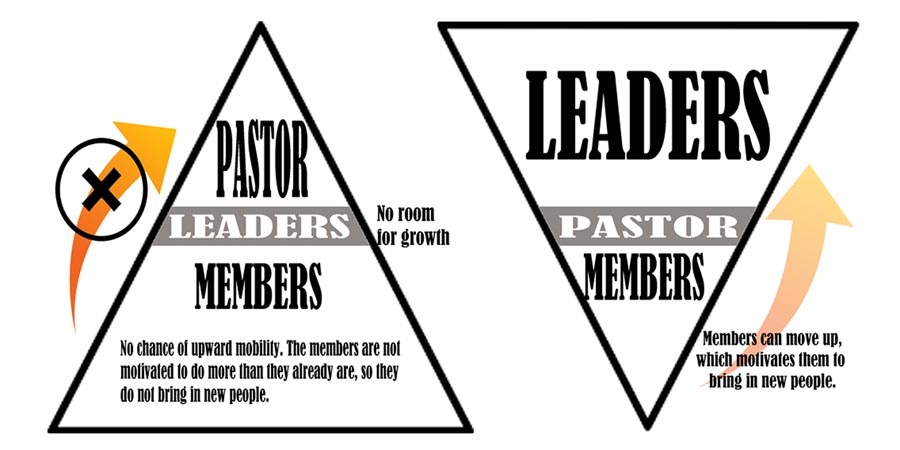People choose churches based on various things, as you know. In my opinion, the list includes the following in this order:
- Location– If someone can find a church which includes all, or most of, the rest of this list, they will go to that church first.
- Doctrine – People can, and do, ignore closer located churches if one that is further away adheres to their doctrinal choices.
- Friendliness – Just because a church believes the way you do, does not make up for bad behavior or lack of friendliness on the part of the members. Friendly members can make up for a lack of some of the following items.
- Structure (organizational) – Members may ignore the lack of structure for a while, and some members will never quite have a problem with any lack of structure, but in the long run, many of those who are troubled will go away without ever verbalizing their feelings. Structure in the church emphasizes the Biblical mandate that all things be done in order, as well as give people a sense of security as members. A structured organization implies long term progress and success. People feel a sense of purpose and direction.
- Worship and praise – If all of the above is functioning as is expected, it will be evident to the membership. This releases the members from the stress of concerning themselves with the direction of the church, or its longevity. This frees the person to focus more so on their relationship with the Lord. Worship and praise comes naturally to people who are not pulled emotionally by distress, problems, and lack of clear direction from the pastorate, and church leadership.
- Preaching/Teaching styles – A congregation which feels free to express their worship and praise due to their sense of stability and purpose, will more readily appreciate the message from the Word taught or preached. Because they will see much of the teaching and preaching being lived out in the practices of the church, through the actions of the pastor(s) and leadership, they will also be more receptive to instruction.
- Upward mobility – Upward mobility is that opportunity for members to move into leadership positions, as well as possibly, into the pastorate. Ephesians 4: 11-16 clarifies the need for training and preparation of the membership for the work of the ministry. Each member should be instructed, at an appropriate time in their growth in the Lord, their personal calling from God. This would include training, instruction, and direction, on the part of the church leadership, as well as the pastorate. The concept is the same as the possibility of being promoted at work. This is an effective incentive for people. The same will be true in church. The church must brand itself, not only as a place of seeking and finding knowledge in Christ, but as a place where they may be ministered to, and also where they may minister to others.

- Ministry opportunities – internal – If all of the above is in place and functioning correctly, People within the church will have options for ministry and personal involvement. People who volunteer demonstrate a love for their church, and they will invite others to “their” church.
- Ministry opportunities – public – As members mature, they also tend to become restless (wanting to do more). These mature members need to have outlets for the desire to serve the Lord. There should be opportunities available, or at least, encouraged, as means of ministry. This may include personal ministries outside the church, but under the umbrella of the church’s authority. In some cases, members should be encouraged to start the on congregations, which also may be under the “umbrella’ of their present church authority. Members who are ready to “move up” and don’t find the opportunity at their present church will leave and look elsewhere.
- Money management – This is a two sided sword. On the one hand, if all of the above are function appropriately, the member will give and trust the money is being handled appropriately as well. On the other hand, if some or most of the above are not functioning well, the discouraged members struggle being motivated to give their minimum, much less over and above. In some cases, the members will “punish” the church, pastor, and/or leaders, by withholding financial support for the church in total.
Persons who come to the church from other congregations, will compare what is offered at this church to what was offered at the last church. More mature believers who look for a (new) church, will have slightly different, but nevertheless just as important, concerns:
- Do I agree with their doctrine? Self-explained.
- Are they open to my participation? These more mature Christians do not want to leave one church where they had limited opportunities for ministry, just to end up somewhere else where the situation will be the same.
- Will I be used effectively while I am attending there? Is the pastor confident in him or herself, enough to work with someone who may be better qualified than them in some areas of ministry or function? Some pastors are intimidate by Christians with strong character who are also professionals or better educated than they.
- Will I have preaching and teaching opportunities (and not just teaching the youth)? More mature Christians want the opportunity to do more than just attend church and have someone preach and teach to them things they already know. They want to start preaching and teaching as well.
- Will I have the ear of the pastor(s)/Leadership? Every church has a group of people who have a closer relationship with the pastor, and those who are on the fringes. This was so in Biblical times as well. The problem comes when someone who is willing to do more and be more available to the pastor or leaders for ministry, is left out of the “inner circle.” These persons will tend to interpret this as if they are not welcome, or not appreciated. These will eventually leave the church. Those that feel that they have the pastor’s ear, or at least that of a leader who is close to the pastor, will feel they have someone with whom to share ideas and offer suggestions, and, at least, be heard. These people can be expected to do more, be more available, and to be more willing to give (financially) more to the work of the church.







It’s great that you talked about how it’s important to consider a church’s location when choosing one. Recently, my wife and I moved from our old neighborhood, so we need to find a new church. My wife’s more religious than me, so she’s eager to find a church to attend, and I believe this article could help us. Thanks for the tips about what to consider when looking for a church.
You are welcome. By the way, I would like to recommend the following book to read regarding how religious one may or may not be and why? God bless you.